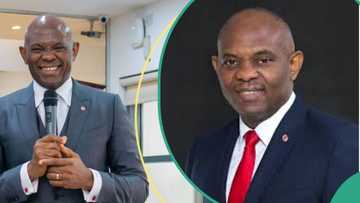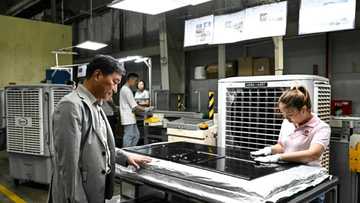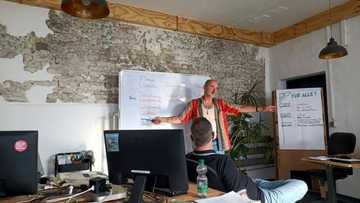How SunFi is Building a Solar Community Where Everyone Gets What They Want - CEO, Rotimi Thomas
- The removal of fuel subsidies has triggered the demand for solar energy across Nigeria
- SunFi is a Nigerian clean tech startup that connects a pool of installers and sellers to customers
- The startup is creating jobs for people to make money and serve their communities
Accessing stable electricity that is clean, noiseless, and doesn’t pollute the environment to cause health issues remains a problem in Nigeria.
For a very long time, generators have been relied upon to provide electricity, but they have become exceedingly expensive. As a result, consumers are on the lookout for alternatives that don’t eat up their whole income.
SunFi solves that problem of looking for the right solution in a guided way. The Nigerian clean tech startup connects a pool of installers and sellers to customers.
More importantly, its lease-to-own offering allows consumers to pay over 12 to 24 months after depositing, and its subscription-based offering enables businesses and MSMEs to get started with a low payment by getting access to solar as a service without the need to own them.

Source: UGC
PAY ATTENTION: Join Legit.ng Telegram channel! Never miss important updates!
Rotimi Thomas, CEO and co-founder of SunFi in an exclusive interview told Legit.ng that consumers are not getting the education they need on solar, and some of them are trying to solve their problems themselves by picking the first thing that looks cheap to them, but cheap is not always the best.
He said:
The quality of solar here now is different from what we had at the start of the sector in Nigeria. I find that consumers still need to be educated about their options. You can go online and buy any random equipment that may not be good, but when you have someone guiding you, you will be able to choose the right one.
SunFi uses technology to coordinate stakeholders
According to the co-founder, the platform uses technology to coordinate everything so that different stakeholders get what they want.
Besides helping customers save hundreds of millions, Thomas and his team are helping to address issues around climate change in addition to saving millions of naira for consumers and creating jobs for people to make money and serve their communities.
He stated that indulging in solar jobs will be one of the most popular in Nigeria in a few years.
More people are starting to tap into the practice, especially following the removal of the fuel subsidy, which has exposed the reality of the cost of petrol, and some businesses and shops are eventually shutting down because they cannot meet up.
In his view, however, the development is creating a more vibrant market for solar dealers as more people are beginning to embrace clean energy.
He said:
With this fuel price surge, we have seen a huge demand from partners, and consumers, and I think we will see a lot more because you basically can’t run your business anymore if you are running a petrol generator, which has gone about 3.5 times higher.
We see a more vibrant opportunity in different markets going forward, but it is also on us to make sure that we are in every local government and ensure the agents are well-trained.
Sooner or later, the team wants to see more men and women become part of the largest database of registered electricians who convert their skills to solar.
Beyond solar, however, Thomas revealed that SunFi plans to supply other low-carbon technologies in the future.
According to him, the platform is looking to venture into electric mobility, sustainable housing that comes with clean energy inside, sustainable and clean energy for agriculture, and other verticals.
While many raise doubts about electric mobility considering the power situation in Nigeria, Thomas believes that appropriate coordination between stakeholders like petrol stations, states, financial entities, cities, businesses, and real estate owners will make it work.
Funding the business
The company recently raised $2.325 million in seed funding from lead investors, Nairobi-based Factor[e] and SCM Capital Asset Management, and other participating investors such as Voltron Capital, Norrsken Impact Accelerator, Ventures Platform, and Sovereign Capital.
Commenting on this, he said the startup has been able to grow its presence and position the brand in the minds of consumers, investors, and solar partners thanks to the funding.
We are building a community. In our solar community, it is the solar partners that are the superheroes. We live and die by the success of our solar partners, serving consumers properly, and we ensure that the lenders see that so they can put the money in to support the community. This is important to be able to build the team, finance access, help innovation, and become more aggressive in the market.
Even though the venture capital landscape and funding have become tougher around the world, SunFi is encouraged because, in the climate and energy space, there is still a lot of support as the problems it is solving remain fundamental.
Over the decades, there’s been a cycle of funding booms and busts, but Thomas believes that companies that will survive will need to create more value.

Read also
"Expect more companies to shut down, more job losses in Nigeria" - Chima Ugonna, CEO of Sterling Manufacturing
Challenges prevalent in the industry
Thomas believes that there is more to be done in terms of consumer education in order for people to know their options while highlighting that the cost of capital is another big issue.
He said:
But our job is to make it easier for financial institutions to put the money in the solar economy; hopefully, the more comfortable they get with the data we are showing them, the more available the capital will be.
He added that things like logistics and distribution are not easy in the country, as customers have a lot on their minds and people are trying to find different opportunities to earn money in hard terrain.
Regardless of the challenges, Thomas said the startup wants to change the landscape in within the next 10 years.
Speaking on recent government policies and how they influence business, he noted:
We are happy that the government supports solar. I think there’s been a positive environment, but more could be done at the port to import the equipment and make it faster. Also, it will be nice for policymakers to remove all these minor duties that inflate the cost.

Read also
"240MW of Electricity Can Power 1 Million Homes": Tony Elumelu Reveals Insufficient Gas causes Power Issues
FG begins distribution of free solar systems as electricity tariff goes up
In related news, Legit.ng reported that the Nigerian government has initiated the rollout of complimentary solar home systems throughout the country in an effort to alleviate the negative consequences resulting from the removal of fuel subsidies.
Ahmad Salihjo, the Managing Director of the Rural Electrification Agency, has indicated that the government has tasked the agency with expanding the distribution of additional free solar systems to households, educational institutions, and medical facilities nationwide.
Salihjo further clarified that the agency was required to levy a fee for the deployment of solar systems in markets and agricultural plantations, whereas installations in homes, hospitals, and schools were conducted without any cost to the beneficiaries.
Source: Legit.ng





